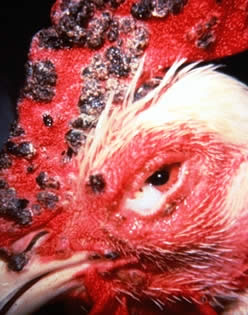Fowl Pox
Fowl pox
Fowl pox is a relatively slow-spreading viral infection that affects most bird species, including all commercial forms of poultry. It occurs in both a wet and dry form. The wet form is characterised by plaques in the mouth and upper respiratory tract. The dry form is characterised by wart-like skin lesions that progress to thick scabs. The disease may occur in any age of bird, at any time. Mortality is usually not significant unless respiratory involvement is severe. Fowl pox can cause depression, reduced appetite and poor growth or egg production. The course of the disease in the individual bird takes three to five weeks.

Skin lesions caused by fowl pox Source: The Merck Veterinary Manual
What causes fowl pox?
Fowl pox is caused by an avian DNA pox virus. There are five or six closely related viruses that primarily affect different species of birds but there is some cross-infection. Infection occurs through skin abrasions or bites, through the respiratory route and possibly through ingestion of infective scabs. It can be transmitted by birds, mosquitoes or fomites (inanimate objects such as equipment). The virus is highly resistant in dried scabs and under certain conditions may survive for months. Mosquitoes can harbour infective virus for a month or more after feeding on affected birds and can subsequently infect other birds. Recovered birds do not remain carriers. A flock may be affected for several months as fowl pox spreads slowly.
Prevention and treatment of fowl pox
There is no treatment for fowl pox and prevention is through vaccination of replacement birds. Where preventative vaccination is used, all replacement chickens are vaccinated when the birds are six to ten weeks of age and one application of fowl pox vaccine results in permanent immunity. Vaccination of broilers is not usually required unless the mosquito population is high or infections have occurred previously. Chicks may be vaccinated as young as one day of age. During outbreaks, unaffected flocks and individuals may be vaccinated to help limit the spread. If there is evidence of secondary bacterial infection, broad-spectrum antibiotics may help reduce morbidity and mortalities. As mosquitoes are known reservoirs, mosquito control procedures may be of some benefit in limiting spread in poultry confined in houses.

